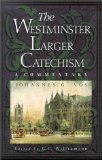Here's an updated version of the Shorter Catechism (click to order):
In the 1940's Johannes Geerhardus Vos wrote a series of articles for a magazine called Blue Banner Faith and Life in which he commented on the Larger Catechism. Those articles are collected here:
I think Vos would say that man's chief "end" is God's purpose for man, which is that man glorify God and enjoy Him forever, and that man should choose to honor God's purpose for man.
On "light of nature," Vos says:
This means the natural revelation of God in the human heart and mind. This "light of nature" is common to all mankind. The heathen who have never received God's special revelation, the Bible, have a certain knowledge of God by nature, and a certain consciousness of the moral law in their own hearts (Romans 2:14-16). To believe in God is natural to mankind; only "the fool" says in his heart that there is no God.On "the works of God," Vos says,
This expression means the revelation of God in nature outside of human nature. It includes the whole realm of nature, great and small. The starry heavens as observed by the largest telescope, and the tiniest particles of matter than can be photographed by the electron microscope, all disclose the God who is their Creator and Ruler. The works of God also include all living creatures, and all God's works in the course of human history. All bear witness to the invisible God who created, preserves, and controls them all.He adds,
The light of nature and the works of God bring to mankind a message concerning the existence of God, His eternal power and deity (Romans 1:19-20), His glory (Psalm 19:1), and His moral law (Romans 2:14-16). This natural revelation of God and of His will is sufficient to leave men without excuse for their sins (Romans 1:20-21).







No comments:
Post a Comment